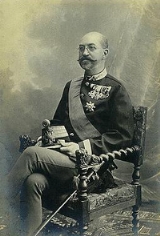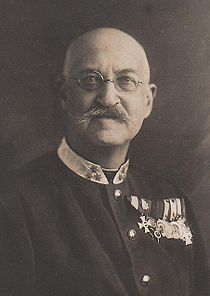
Duke of Cumberland
Encyclopedia

Cumberland
Cumberland is a historic county of North West England, on the border with Scotland, from the 12th century until 1974. It formed an administrative county from 1889 to 1974 and now forms part of Cumbria....
.
History
The first creation, in the Peerage of EnglandPeerage of England
The Peerage of England comprises all peerages created in the Kingdom of England before the Act of Union in 1707. In that year, the Peerages of England and Scotland were replaced by one Peerage of Great Britain....
, was in 1644 for Prince Rupert of the Rhine
Prince Rupert of the Rhine
Rupert, Count Palatine of the Rhine, Duke of Bavaria, 1st Duke of Cumberland, 1st Earl of Holderness , commonly called Prince Rupert of the Rhine, KG, FRS was a noted soldier, admiral, scientist, sportsman, colonial governor and amateur artist during the 17th century...
, nephew of King Charles I
Charles I of England
Charles I was King of England, King of Scotland, and King of Ireland from 27 March 1625 until his execution in 1649. Charles engaged in a struggle for power with the Parliament of England, attempting to obtain royal revenue whilst Parliament sought to curb his Royal prerogative which Charles...
. When he died without heirs, the title was created again in the Peerage of England in 1689 for Prince George of Denmark, husband of Princess Anne
Anne of Great Britain
Anne ascended the thrones of England, Scotland and Ireland on 8 March 1702. On 1 May 1707, under the Act of Union, two of her realms, England and Scotland, were united as a single sovereign state, the Kingdom of Great Britain.Anne's Catholic father, James II and VII, was deposed during the...
, younger daughter of King James II
James II of England
James II & VII was King of England and King of Ireland as James II and King of Scotland as James VII, from 6 February 1685. He was the last Catholic monarch to reign over the Kingdoms of England, Scotland, and Ireland...
. He also died without heirs, in 1708. Neither of these men, however, was usually known by their peerage title.
The third creation, in the Peerage of Great Britain
Peerage of Great Britain
The Peerage of Great Britain comprises all extant peerages created in the Kingdom of Great Britain after the Act of Union 1707 but before the Act of Union 1800...
, was for Prince William, the third son of King George II
George II of Great Britain
George II was King of Great Britain and Ireland, Duke of Brunswick-Lüneburg and Archtreasurer and Prince-elector of the Holy Roman Empire from 11 June 1727 until his death.George was the last British monarch born outside Great Britain. He was born and brought up in Northern Germany...
. Other titles granted to Prince William were Marquess of Berkhampstead, Earl of Kennington, Viscount Trematon and Baron Alderney. Since the Prince died unmarried and without children, his titles became extinct at his death.
The title was created again in the Peerage of Great Britain, but the form being changed to "Cumberland and Strathearn
Strathearn
Strathearn or Strath Earn is the strath of the River Earn, in Scotland. It extends from Loch Earn in Perth and Kinross to the River Tay....
". The dukedom and also the Earldom of Dublin
Earl of Dublin
Earl of Dublin is a title that has been created three times in British history.It was created first on 22 October 1766 in the Peerage of Ireland for Prince Henry, Duke of Cumberland and Strathearn, younger brother of King George III. This title became extinct in 1790 upon the Duke's dying childless...
in the Peerage of Ireland
Peerage of Ireland
The Peerage of Ireland is the term used for those titles of nobility created by the English and later British monarchs of Ireland in their capacity as Lord or King of Ireland. The creation of such titles came to an end in the 19th century. The ranks of the Irish peerage are Duke, Marquess, Earl,...
were bestowed on Prince Henry, the third son of Frederick, Prince of Wales
Frederick, Prince of Wales
Frederick, Prince of Wales was a member of the House of Hanover and therefore of the Hanoverian and later British Royal Family, the eldest son of George II and father of George III, as well as the great-grandfather of Queen Victoria...
, and grandson of King George II
George II of Great Britain
George II was King of Great Britain and Ireland, Duke of Brunswick-Lüneburg and Archtreasurer and Prince-elector of the Holy Roman Empire from 11 June 1727 until his death.George was the last British monarch born outside Great Britain. He was born and brought up in Northern Germany...
. Since Prince Henry died without legitimate children, the title became extinct again.
The last creation (the form being "Duke of Cumberland and Teviotdale") was for Ernest Augustus
Ernest Augustus I of Hanover
Ernest Augustus I was King of Hanover from 20 June 1837 until his death. He was the fifth son and eighth child of George III, who reigned in both the United Kingdom and Hanover...
(later King of Hanover), fifth son of King George III of the United Kingdom
George III of the United Kingdom
George III was King of Great Britain and King of Ireland from 25 October 1760 until the union of these two countries on 1 January 1801, after which he was King of the United Kingdom of Great Britain and Ireland until his death...
. The title was suspended for the third Duke's
Ernest Augustus II of Hanover, 3rd Duke of Cumberland and Teviotdale
Ernst August, Crown Prince of Hanover, Heir of Brunswick, 3rd Duke of Cumberland and Teviotdale, 3rd Earl of Armagh, , was the eldest child and only son of George V of Hanover and his wife, Marie of Saxe-Altenburg...
pro-German activities during World War I under the 1917 Titles Deprivation Act, as it was for his son. Under the Act the lineal male heirs of the 3rd Duke of Cumberland and Teviotdale have the right to petition the British Crown for the restoration of his peerages. To date, none has done so. The present heir is Prince Ernst August of Hanover
Ernst August V, Prince of Hanover
Ernst August, Prince of Hanover , is the third husband of Princess Caroline of Monaco, heiress presumptive to the throne of Monaco...
(born 26 February 1954), great grandson of the 3rd Duke and current head of the House of Hanover
House of Hanover
The House of Hanover is a deposed German royal dynasty which has ruled the Duchy of Brunswick-Lüneburg , the Kingdom of Hanover, the Kingdom of Great Britain, the Kingdom of Ireland and the United Kingdom of Great Britain and Ireland...
. He is the senior male-line descendant of George III of the United Kingdom
George III of the United Kingdom
George III was King of Great Britain and King of Ireland from 25 October 1760 until the union of these two countries on 1 January 1801, after which he was King of the United Kingdom of Great Britain and Ireland until his death...
.
Dukes of Cumberland, first Creation (1644)
- also Earl of Holderness (England, 1644)
- Prince Rupert of the RhinePrince Rupert of the RhineRupert, Count Palatine of the Rhine, Duke of Bavaria, 1st Duke of Cumberland, 1st Earl of Holderness , commonly called Prince Rupert of the Rhine, KG, FRS was a noted soldier, admiral, scientist, sportsman, colonial governor and amateur artist during the 17th century...
, Duke of Cumberland (1619–1682), nephew of Charles ICharles I of EnglandCharles I was King of England, King of Scotland, and King of Ireland from 27 March 1625 until his execution in 1649. Charles engaged in a struggle for power with the Parliament of England, attempting to obtain royal revenue whilst Parliament sought to curb his Royal prerogative which Charles...
, died without legitimate issue
- Prince Rupert of the Rhine
Dukes of Cumberland, second Creation (1689)
- also Earl of Kendal and Baron Wokingham (England, 1689)
- Prince George of Denmark, Duke of Cumberland (1653–1708), husband of Queen AnneAnne of Great BritainAnne ascended the thrones of England, Scotland and Ireland on 8 March 1702. On 1 May 1707, under the Act of Union, two of her realms, England and Scotland, were united as a single sovereign state, the Kingdom of Great Britain.Anne's Catholic father, James II and VII, was deposed during the...
, died without surviving issue.
- Prince George of Denmark, Duke of Cumberland (1653–1708), husband of Queen Anne
Dukes of Cumberland, third Creation (1726)
- also Marquess of Berkhamstead, Earl of Kennington, Viscount Trematon and Baron Alderney (Great Britain, 1726)
- The Prince William, Duke of Cumberland (1721–1765), also known as "Butcher" Cumberland and Sweet William, was a younger son of George IIGeorge II of Great BritainGeorge II was King of Great Britain and Ireland, Duke of Brunswick-Lüneburg and Archtreasurer and Prince-elector of the Holy Roman Empire from 11 June 1727 until his death.George was the last British monarch born outside Great Britain. He was born and brought up in Northern Germany...
, but died without issue.
- The Prince William, Duke of Cumberland (1721–1765), also known as "Butcher" Cumberland and Sweet William, was a younger son of George II
Dukes of Cumberland and Strathearn (1766)
- also Earl of Dublin (Ireland, 1766)
- Prince Henry, Duke of Cumberland and Strathearn (1745–1790), fourth son of Frederick, Prince of WalesFrederick, Prince of WalesFrederick, Prince of Wales was a member of the House of Hanover and therefore of the Hanoverian and later British Royal Family, the eldest son of George II and father of George III, as well as the great-grandfather of Queen Victoria...
, died without issue.
- Prince Henry, Duke of Cumberland and Strathearn (1745–1790), fourth son of Frederick, Prince of Wales
Dukes of Cumberland and Teviotdale (1799)
- also Earl of Armagh (Ireland, 1799)
- The Prince Ernest Augustus, Duke of Cumberland and TeviotdaleErnest Augustus I of HanoverErnest Augustus I was King of Hanover from 20 June 1837 until his death. He was the fifth son and eighth child of George III, who reigned in both the United Kingdom and Hanover...
(1771–1851), fifth son of George IIIGeorge III of the United KingdomGeorge III was King of Great Britain and King of Ireland from 25 October 1760 until the union of these two countries on 1 January 1801, after which he was King of the United Kingdom of Great Britain and Ireland until his death...
, became King of Hanover in 1837 - George V of HanoverGeorge V of HanoverGeorge V was King of Hanover, the only child of Ernest Augustus I, and a grandchild of King George III of the United Kingdom. In the peerage of Great Britain, he was 2nd Duke of Cumberland and Teviotdale, 2nd Earl of Armagh...
, Duke of Cumberland and Teviotdale (1819–1878), eldest son of Ernest Augustus I, was deposed in 1866 - Ernest Augustus, Crown Prince of Hanover, Duke of Cumberland and Teviotdale (1845–1923), eldest son of George V, was deprived of his British honours in 1919
- The Prince Ernest Augustus, Duke of Cumberland and Teviotdale
Heirs to the Dukedom, if restored
- Ernst August III, Duke of Brunswick (1887–1953), eldest son of the last Crown Prince and son-in-law of German Emperor William II.
- Ernest Augustus IV, Prince of Hanover (1914–1987), elder son of Ernest Augustus III
- Ernst August V, Prince of Hanover (b 1954), eldest son of Ernest Augustus IV
- His heir-apparent would be his elder son Prince Ernst August of Hanover (b 1983)
See also
- King of Hanover

